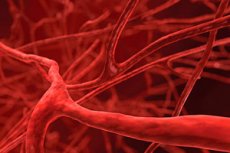New publications
Study links protein secreted by blood vessels to drug-resistant cancer
Last reviewed: 02.07.2025

All iLive content is medically reviewed or fact checked to ensure as much factual accuracy as possible.
We have strict sourcing guidelines and only link to reputable media sites, academic research institutions and, whenever possible, medically peer reviewed studies. Note that the numbers in parentheses ([1], [2], etc.) are clickable links to these studies.
If you feel that any of our content is inaccurate, out-of-date, or otherwise questionable, please select it and press Ctrl + Enter.

Cancer is one of the leading causes of death worldwide. One of the main reasons why cancer is such a deadly disease is the ability of cancer cells to become resistant to drugs.
After decades of medical research, scientists have come to understand that malignant tumors often contain a special population of cells called cancer stem cells (CSCs). Like normal stem cells, CSCs can self-replicate and differentiate into different cell types within the tumor, playing important roles not only in tumor growth and metastasis but also in the development of drug resistance.
Unfortunately, developing therapies that directly target CSCs has proven challenging given their ability to adapt and repopulate. So some researchers have turned their attention to the blood vessels within tumor tissue.
Over the past few years, scientists have discovered that certain subpopulations of endothelial cells (the cells that line blood vessels) secrete angiocrine factors that regulate stem cell proliferation and maturation. Understanding which cells produce these factors and what their functions are in the tumor microenvironment may, in turn, lead to the development of new cancer therapies.
Against this background, a research team from Japan, including Professor Hiroyasu Kidoya and Dr. Yumiko Hayashi from the Department of Integrative Vascular Biology, Faculty of Health Sciences, University of Fukui, conducted a study on secreted frizzled-related protein 1 (Sfrp1), an angiocrine factor, to clarify its role in tumor tissues.
Their results were published online in the journal In Vitro Cellular & Developmental Biology.
"While blood vessels are usually considered only as routes for oxygen and nutrients, our study focused on a completely different function of blood vessels, namely the production of angiocrine factors. We conducted this study with the idea that angiocrine factors may also be involved in tumor progression and sought to find out whether Sfrp1 affects the maintenance of CSCs and tumor tissue in general," explains Professor Kidoya.
To clarify these questions, the researchers created Sfrp1 knockout (Sfrp1-KO) mice using CRISPR-Cas9 gene editing. They then transplanted lung carcinoma tumors into Sfrp1-KO and wild-type mice and observed the effects of Sfrp1 (or lack thereof) using standard techniques such as immunohistochemical staining, flow cytometry, and quantitative genetic expression analysis.
Initial experiments showed that Sfrp1 is produced by a small subset of vascular endothelial cells in tumor tissue and that its presence is important for tumor growth. Tumor growth was suppressed in Sfrp1-KO mice, and transplanted tumor cells overexpressing Sfrp1 resulted in faster tumor growth.
Interestingly, the researchers found that tumors lacking Sfrp1 were unable to support significant CSC populations at late stages of tumor growth, despite these tumors having a higher initial percentage of CSCs. This finding is particularly important as it points to one of the biological roles of Sfrp1 in the tumor microenvironment and its involvement in cancer pathology.
“Some CSCs in tumor tissues are in a state of cell proliferation arrest, and their presence promotes tumor growth and resistance to anticancer drugs,” explains Professor Kidoya. “Our results indicate that Sfrp1 may regulate CSC self-reproduction and transient malignant growth, as well as maintain dormancy.”
Further results showed that Sfrp1 does not affect the structure of blood vessels within the tumor, suggesting that the observed effects on tumor growth are not related to the vasculature. Instead, genetic expression analysis revealed that Sfrp1 promotes CSC maintenance by modulating the well-conserved Wnt signaling pathway (an evolutionarily conserved pathway that regulates important aspects of cell fate determination, cell migration, and organogenesis during embryonic development).
Overall, the new knowledge provided by this study may pave the way for the development of new cancer therapies that target the mechanisms that help maintain CSCs.
“Targeting specialized vascular endothelial cells involved in the production of angiocrine factors may help disrupt the CSC niche, serving as a potential approach to inhibiting tumor growth with minimal side effects,” concludes Professor Kidoya.
"I believe this could lead to the development of treatments for patients with difficult-to-treat cancer whose tumors are resistant to anti-cancer drugs, as well as therapeutics to suppress cancer recurrence and metastasis."
Further research based on these findings will serve as a stepping stone to effective treatments for drug-resistant cancer.
